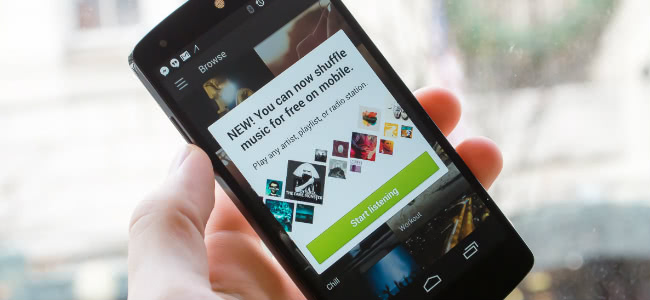With all of the chatter about streaming services conspiring to provide major labels with better exposure in exchange for more desirable royalty rates and at the expense of indie labels who don’t have the muscle to sit at the big boys’ table, it’s understandable if you regard them with a little bit of mistrust.
When you view your recommendations list, you’re sure it’s just a list of artists whose labels forked over payola to the streaming platform, and when you hit shuffle… well, is it just us, or is the supposedly random play order not quite random? How else do you explain the three Taylor Swift songs in a row, right?
Well, it turns out the latter may have more to do with our flawed concept of “random” than with services like Spotify. In fact, as the BBC reports, Spotify have had to change up their shuffle algorithm to account for our bothersome idea of what random is supposed to sound like, i.e. not actually random.
“On my 442 song playlist, the same 30 or 35 tracks play over and over again and the other 400 songs I have barely heard once,” one user wrote on a Spotify forum, via the Daily Mail. “It’s almost unbelievable to me that such a simple process is broken,” another user wrote.
Spotify has denied allegations of ‘fixing’ their shuffle option, and the science agrees. “Our brain is an excellent pattern-matching device,” Babar Zafar, a lead developer at Spotify, tells the BBC World Service. “It will find patterns where there aren’t any.”
[include_post id=”434693″]
Indeed, the human brain is basically designed to notice coincidences. It’s also programmed to expect something to happen if it hasn’t occurred in a while. For example, we think that if we haven’t won anything on a scratchy in a while, we’ve got a better chance of winning the next time.
Love The Beatles?
Get the latest The Beatles news, features, updates and giveaways straight to your inbox Learn more
The phenomenon even has a name – Gambler’s fallacy. “If you just heard a song from a particular artist, that doesn’t mean that the next song will be more likely from a different artist in a perfectly random order,” write Spotify on their blog.
“The problem is that, to humans, truly random does not feel random,” said Mattias Johansson, a Spotify software engineer, during a Q&A on Quora. “So we got tons of complaints from users about it not being random. Last year, we updated it with a new algorithm that is intended to feel more random to a human.”
To counteract the Gambler’s fallacy, Spotify ensured different genres are now spread evenly over a playlist. For example, if there are five Beatles songs in a playlist, they will appear at 20 percent intervals. It’s not random, but it feels that way to the human brain.
“Working at Spotify has taught me a few things, one of them being is that it’s really, really, really hard to build something that a human will genuinely feel is shuffled,” Johansson said. “People still constantly come up to me at parties and tell me that the shuffle functionality is not random.”
So your suspicions were right all along, Spotify’s shuffle isn’t actually random. Well, not anymore it isn’t. It was originally, but because that version of random (the true version of random) didn’t appear random enough to us, they had to change it. The human brain, right?



































